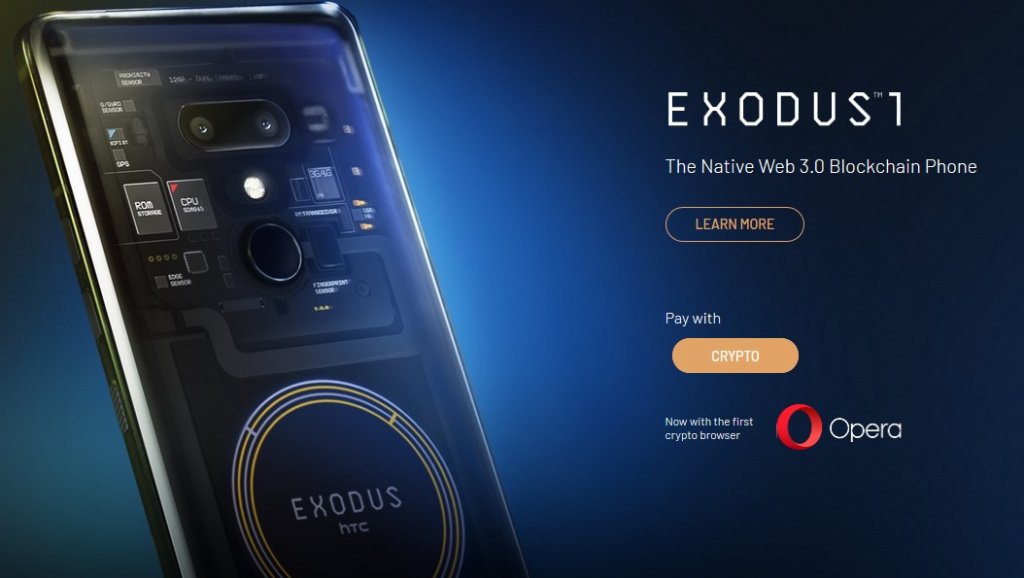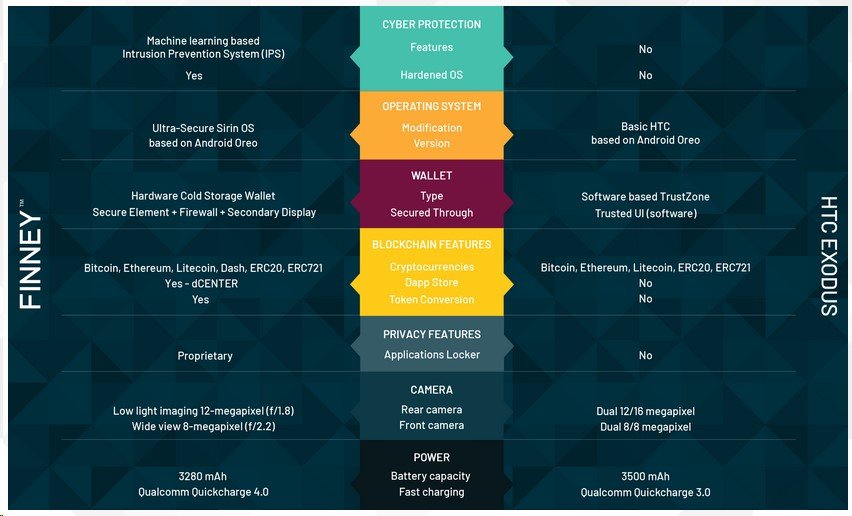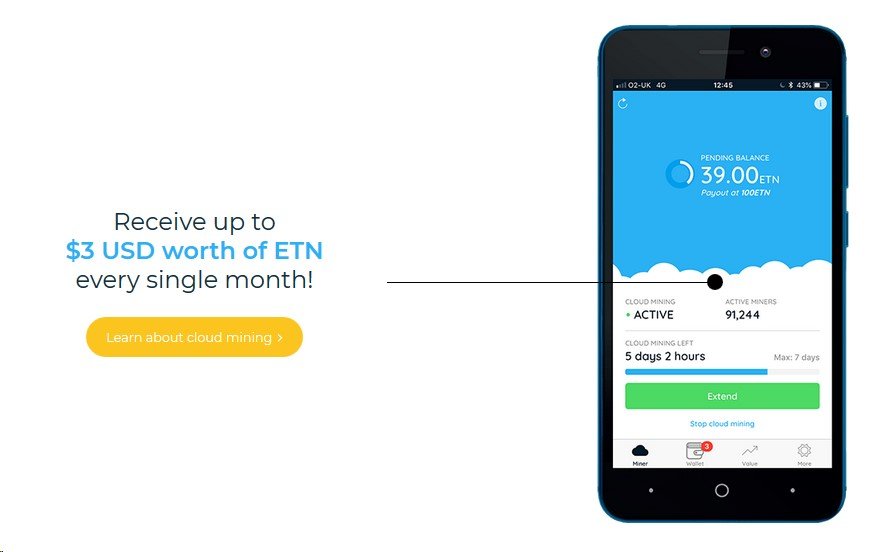Blockchain Smartphones. What’s Wrong With The Hype?
Smartphones with the "blockchain" prefix is probably the most popular news topic. Meanwhile, do not rush to believe the advertising. In this article, we will try to figure out whether the enthusiasm of commentators is justified and understand what exactly blockchain smartphones are. And in the end, do they exist at all?
The Galaxy S10 model of the South Korean corporation traditionally opposes with Apple's phones. The best screens and cameras, the most powerful processors, the latest technologies, the perfect design — it’s a great competition!
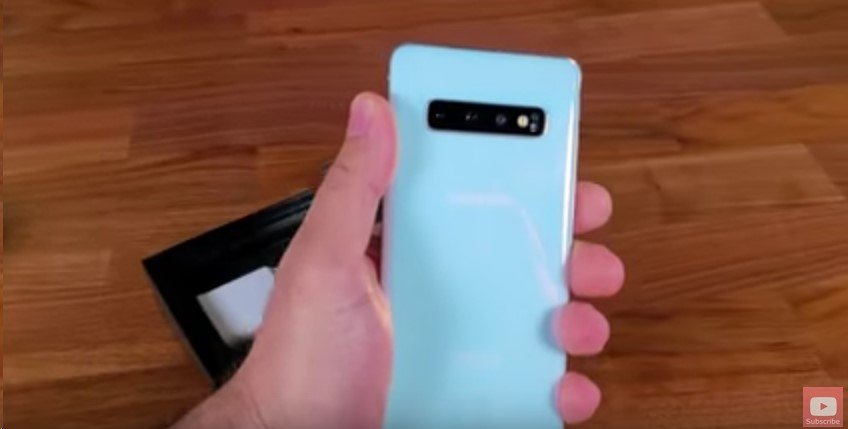
The latest version of the S10 was available for pre-order only (until March 8, 2019) — for those who couldn’t wait. The first users’ reviews about Samsung phones have strongly swayed blockchain community. It turns out that among the numerous applications of this model there is also Samsung Blockchain Keystore — an electronic wallet to store cryptocurrencies.
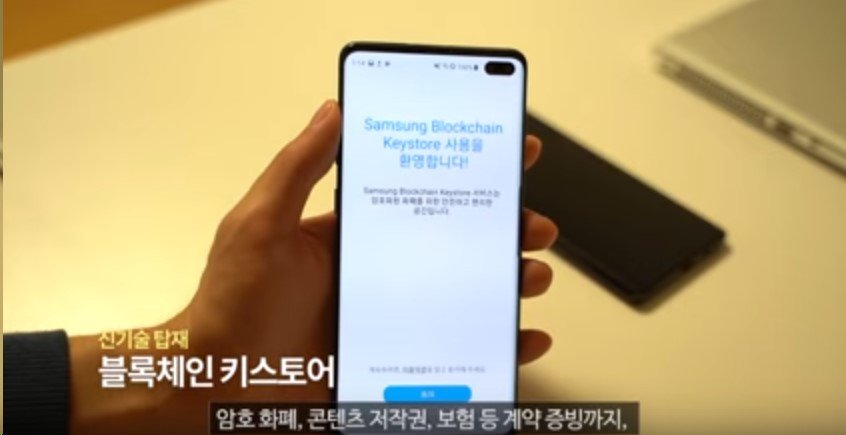
“After all, the industrial giant approves, encourages and strongly supports those users who use cryptocurrencies? Thus, soon all the major manufacturers will introduce blockchain solutions into their products following Samsung, and first of all it will be, Apple with their iPhone!”— this is the way users may think.
The lack of Samsung’s attention to this application hit enthusiasm down. You can find a mention of it in few official messages only.
Blockchain media began to spread the news, based on a single video in which the author did not find any support for Bitcoin in the new Samsung wallet application.
The panic is hardly justified: the ability to create or import a Bitcoin wallet will be likely added later with one of the app updates. Or there will be not — in general, it is not so important. It is unlikely that there are so many people who are very interested in Bitcoin, blockchain and cryptocurrency among consumers of smartphones of the highest price segment ($700-1,000) from Samsung.
It is enough to say that Samsung Galaxy S10 is not a blockchain smart phone, but simply a good, expensive, beautiful and functional phone with a cryptographic application in the basic set of programs.
And what about new HTC blockchain phone?
Unlike Samsung with the Galaxy S10, HTC with its EXODUS 1 model, uses the blockchain buzzword to the maximum in advertising.
On the homepage of the smartphone, the device is shown in its most advantageous perspective, which has a very futuristic look because of a transparent cover.
Just below the main screen, Vitalik Buterin, Charlie Lee (the founder of Litecoin), and most of other authoritative people in this section of the site are delighted with the new product of HTC.
There are additional specs for blockchain smart phone HTC EXODUS 1 — it can be purchased in cryptocurrency (pre-order). However, by clicking the “CRYPTO” button and going to the payment page, the buyer finds out the price in US dollars.
EXODUS 1 is a great HTC blockchain phone with price $700 and good features: Snapdragon 845 processor; 6 GB of RAM; 128 GB of internal memory; Android 8 operating system; 3500 mAh battery; dual cameras in the back and front (12 + 16 and 8 + 8 megapixels); 6 inch Quad HD + display.
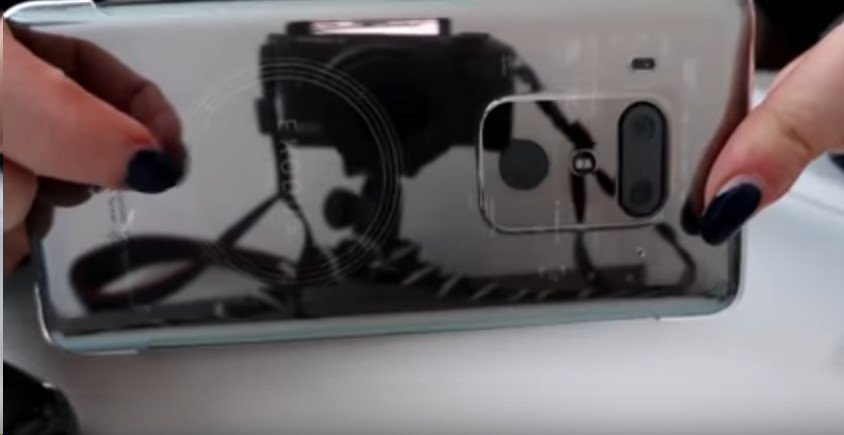
Well, let’s see the options of EXODUS 1, thanks to which it’s proudly called “a blockchain phone”. Trusted Execution Environment (TEE) — this technology is the basis for ZION, a special smartphone application.
It turns out that ZION offers not to trust the Google operating system. If this idea is expressed even more briefly, the smartphone user is asked to trust ZION, and not Android. It is clear that ease of use will always be a compromise with respect to security, and HTC has done its utmost within this framework, but there are flaws in this approach. When EXODUS 1 becomes popular enough for attackers to notice, the key to the isolated ZION repository will be found.
However, the developers of EXODUS 1 know that it is still far from perfect. The head of HTC decentralization department Phil CHEN admits that the technologies used in the blockchain smartphone continue to develop rapidly, and the current state is far from final.
Do other blockchain phones exist?
It would be a big omission in this article not to say about crypto phones from other manufacturers. One of them is Finney by the Sirin Labs company. It’s a competitor to the HTC EXODUS 1, which the manufacturer unequivocally states, giving a comparative table.
Finney is notable for an unusual design element — a mini-screen that slides out at the top of the device, which is both an indicator of operation and a switch of a cold hardware cryptocurrency wallet of a smartphone. The decision is not indisputable, but interesting. The cold wallet is fully implemented: until the screen is pulled out, the storage is turned off and is in a “cold” state.

Speaking about price, the comparison with EXODUS 1 is not in favor of Finney: with similar hardware characteristics, the second one is plus $300 which equals to a thousand. Perhaps the differences from the HTC corporation's smartphone cost exactly that much.
It may seem that the emergence of different models of blockchain smartphones in this article is based on the principle “from more eminent manufacturers to less known ones”. In fact, each next phone of this review shows an ever-greater immersion in the blockchain, and is still far from the bottom line.
XPhone by the Pundi X team is a blockchain phone without reservation. According to the creators, this is “the first blockchain smartphone in the world.” Its functionality is divided into two parts: standard Android applications and pure blockchain services.
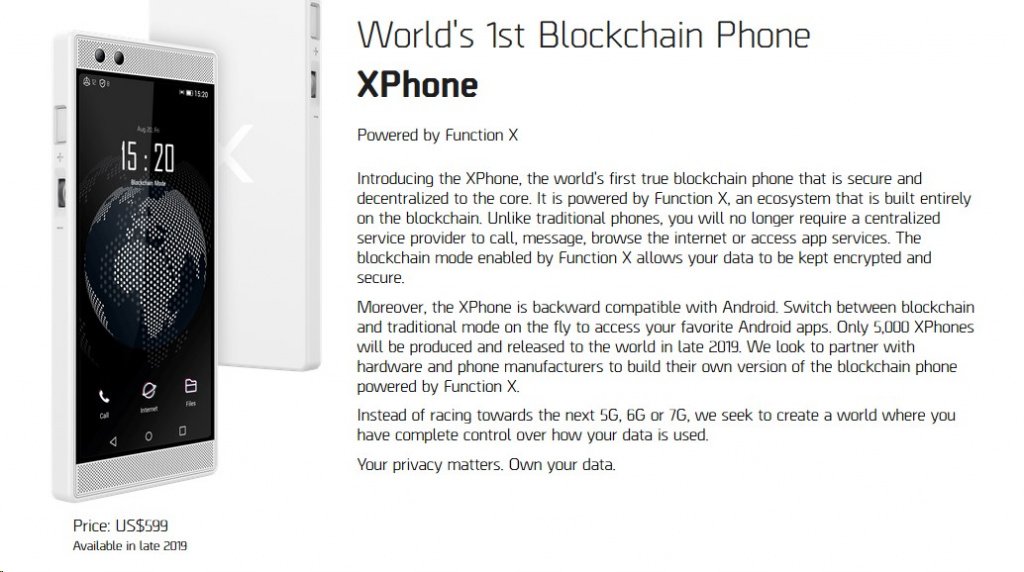
This mobile device will be able to work exclusively in blockchain mode, without using the services of mobile operators, but at the same time allowing you to switch to normal mode. In order to start working with the blockchain, the user will need to create and set a node. These actions are quite difficult for ordinary consumers, but, on the other hand, such manipulations are performed only once. Developers will provide the ability to install decentralized applications in a store similar to Google Play.
Preliminary XPhone specifications show that the device will be similar in characteristics to the above EXODUS 1 and Finney: 6 GB of RAM, 128 GB of permanent memory, 3500 mAh battery, Snapdragon 660.
Unfortunately, XPhone is not ready for mass deliveries yet. This year only five thousand copies are planned for release and sale. The development team has focused on building an ecosystem of blockchain-based devices, Function X, and plans to enter into partnerships with other manufacturers. Pundi X will create specifications, software, and support the platform by transferring device creation functions to third parties.
The latest smartphone in this article may seem a kind of curiosity. This Android device is priced at $80 — Electroneum.M1. Its peculiarity is cloud mining "out of the box."
Blockchain features of this smartphone are Electroneum (ETN) cloud mining cryptocurrency, ETN token instant transfer system, ETN cryptocurrency wallet. The Electroneum project, which sells this mobile device, positions it as a smartphone for emerging markets — inexpensive, with sufficient functionality, with pre-installed blockchain services.
Some readers may notice the substitution and resent: why is this cheap phone, which is one of the many no-name devices made in China, introduced in the review of serious blockchain smartphones? Just because it has applications for mining and storage of cryptocurrency, and the corresponding symbols were applied? They will be somehow right.
Now it will probably be easier to understand why the first smartphone in this article is not a blockchain smartphone. It uses the same principle, only the application is installed not on a cheap phone, but on the flagship model. Now feel the difference.
Image courtesy of Nasdaq

